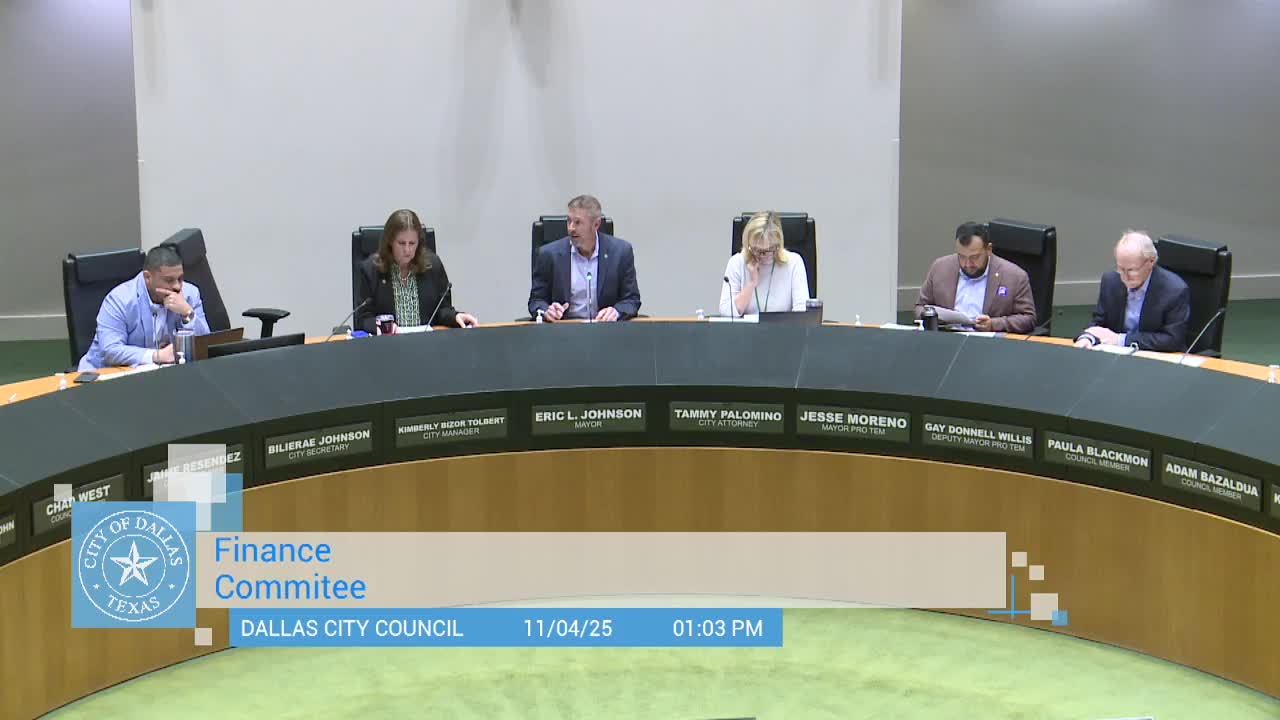Dallas committee directs study of City Hall repair vs. relocation after staff presents wide cost ranges
Get AI-powered insights, summaries, and transcripts
Subscribe
Summary
The Dallas Finance Committee on Nov. 4 directed the city manager to study options for City Hall — including repairing the existing building, leasing, buying or building replacement offices — and asked staff to validate wide repair cost estimates with outside experts.
The Dallas Finance Committee on Nov. 4 directed the city manager to study options for City Hall — including repairing the existing building, leasing, buying or building replacement office space — and to return with a staff update and outside review by February 2026.
Assistant City Manager Donzel Gibson told the committee the presentation included multiple scenarios and intentionally broad ranges to reflect the uncertainty of repairing a 47‑year‑old structure. "There—s just things that there—s no way to know," Gibson said, describing the briefing slides and the rationale for showing low‑, mid‑ and high‑cost scenarios.
The committee pressed staff to clarify the ranges and assumptions behind them. Gibson said a subset of recent estimates that the staff described as "shovel ready" totaled roughly $44 million, but that other adjusted historical estimates and potential structural repairs—most notably to an attached parking garage—could increase costs dramatically. When the garage line item is removed from the calculation, staff said the low range of repairs falls near $125 million and the high range near $200 million depending on the assumptions used.
Jack Ireland, chief financial officer, told the committee there is no on‑hand operating budget sufficient to fund large repairs and that borrowing (issuing debt) and voter approval through a bond program would be the most viable path for substantial work. "If you were to ask me, the most viable option of how to fund the types of repairs— is to borrow funds," Ireland said, adding that pursuing bond funding would likely require rescheduling or reprioritizing projects in the existing bond pipeline.
Jenny Niswander, director of the Office of Bond and Construction Management, said staffing constraints and shifting priorities since 2018 contributed to delays in deploying previously authorized bond funds and committed to researching why city‑hall projects authorized in prior bond packages were not executed.
The committee asked staff to distinguish urgent safety and code items from repairs that could be deferred, and to provide a timeline and funding strategy options. Committee members also emphasized the value question for the City Hall site as downtown develops and identified nontraditional uses—such as data centers, call centers, emergency operations space and ceremonial or public meeting space—to be considered in any reuse or redevelopment study.
Vice Chair Stewart presented a recommended referral to the Nov. 12 City Council agenda asking the city manager, under finance committee guidance, to: evaluate real estate options to advance "option 3" from the presentation; finalize departmental office‑space needs; review citywide lease and purchase opportunities; compare costs to lease, buy or build versus repair; engage external experts to validate deferred‑maintenance estimates; analyze alternate siting for nontraditional uses; and present an update to the committee no later than February 2026. The motion was discussed and the committee provided support; committee counsel agreed to remove a mandatory "executive session" requirement so staff could determine which items required confidential treatment.
The committee and staff agreed the next steps should include a market study of potential sites, side‑by‑side cost comparisons to stay versus move, and third‑party structural engineering or deferred‑maintenance reviews to validate staff numbers.
What happens next: The committee recommended that the item be placed on the Nov. 12 City Council agenda for action on the referral. Staff said it will return with a more detailed funding timeline, clarified assumptions for the cost estimates, and plans for contracting external expertise to review deferred‑maintenance and structural estimates.
